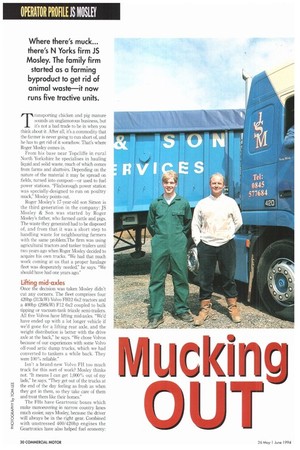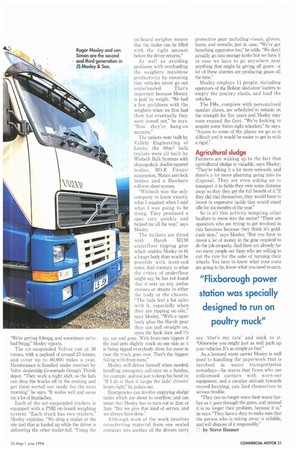Jcking
Page 32

Page 33

If you've noticed an error in this article please click here to report it so we can fix it.
Where there's muck... there's N Yorks firm JS Mosley. The family firm started as a farming byproduct to get rid of animal waste—it now runs five tractive units.
Transporting chicken and pig manure sounds an unglamorous business, but it's not a bad trade to be in when you think about it. After all, its a commodity that the farmer is never going to run short of, and he has to get rid of it somehow. That's where Roger Mosley comes in.
From his base near Topcliffe in rural North Yorkshire he specialises in hauling liquid and solid waste, much of which comes from farms and abattoirs. Depending on the nature of the material it may be spread on fields, turned into compost—or used to fuel power stations. "Flixborough power station was specially-designed to run on poultry muck," Mosley points out.
Roger Mosley's 17-year-old son Simon is the third generation in the company: JS Mosley & Son was started by Roger Mosley's father, who farmed cattle and pigs. The waste they generated had to be disposed of, and from that it was a short step to handling waste for neighbouring farmers with the same problem.The firm was using agricultural tractors and tanker trailers until two years ago when Roger Mosley decided to acquire his own trucks. "We had that much work coming at us that a proper haulage fleet was desperately needed," he says. "We should have had one years ago.
Lifting mid-axles
Once the decision was taken Mosley didn't cut any corners. The fleet comprises four 420hp (313kW) Volvo FH12 6x2 tractors and a 400hp (298kW) F12 6x2 coupled to bulk tipping or vacuum-tank triaxle semi-trailers. All five Volvos have lifting mid-axles. "We'd have ended up with a lot longer vehicle if we'd gone for a lifting rear axle, and the weight distribution is better with the drive axle at the back," he says. "We chose Volvos because of our experiences with some Volvo off-road artic dump trucks, which we had converted to tankers a while back. They were 100% reliable."
Isn't a brand-new Volvo FH too much truck for this sort of work? Mosley thinks not. "It means I can get 1,000% out of my lads," he says. "They get out of the trucks at the end of the day feeling as fresh as when they got in them, so they take care of them
2 and treat them like their homes." )...
_o The FHs have Geartronic boxes which )
ik make manoeuvring in narrow country lanes A much easier, says Mosley, because the driver 6 will always be in the right gear. Combined ." with unstressed 400/420hp engines the Geartronics have also helped fuel economy: 30 COMMERCIAL MOTOR
"We're getting 8.8mpg, and sometimes we've had 9mpg," Mosley reports.
The air-suspended Volvos run at 38 tonnes, with a payload of around 23 tonnes, and cover up to 80,000 miles a year. Maintenance is handled under contract by Volvo dealership Crossroads Group's Thirsk depot. "They work a night shift, so the lads can drop the trucks off in the evening and get them sorted out ready for the next morning," he says. "It works well and saves me a lot of headaches.
Each of the air-suspended trailers is equipped with a PME on-board weighing system: "Each truck has two trailers," Mosley explains. "We drop a trailer at the site and that is loaded up while the driver is delivering the other trailer-full. "Using the on-board weigher means that the trailer can be filled with the right amount before the driver returns."
As well as avoiding problems with overloading the weighers maximise productivity by ensuring that vehicles never go out underloaded. That's important because Mosley is paid by weight. "We had a few problems with the weighers when we first had them but eventually they were ironed out," he says. "Now they're bang-on accurate."
The tankers were built by Vallely Engineering of Leeds; the 60m3 bulk trailers were all built by Wisbech Bulk Systems with sloping-deck double-tapered bodies, RO-R Flexair suspension, Wabco anti-lock brakes and a Dawbarn rollover sheet system.
"Wisbech was the only company to know exactly what I required when I said what I was going to be doing. They produced a spec very quickly and helped me all the way," says Mosley.
The bulkers are fitted with Harsh M130 underfloor tipping gear which enables Mosley to fit a longer body than would be possible with front-end rams. And contrary to what the critics of underfloor might say, he has not found that it sets up any undue stresses or strains in either the body or the chassis. "The lads feel a lot safer with it, especially when they are tipping on-site," says Mosley. "With a taper body plus the Harsh gear they can pull straight on, open the back door and it's up, out and gone. With front-ram tippers if the load gets slightly stuck on one side as it is being tipped everybody dives for cover in case the truck goes over. That's the biggest failing with front rams."
Mosley still drives himself when needed, handling emergency call-outs on a Sunday, for example, and not just to keep his hand in: "If I do it then it keeps the lads' drivers' hours right," he points out.
Emergencies can involve emptying sludge tanks which are about to overflow, and can mean that Mosley has to turn out at 2am or 3am. "But we give that kind of service, and we always have done."
Although most of the work involves transferring material from one sealed container into another all the drivers carry protective gear including visors, gloves, boots, and overalls; just in case. "We've got breathing apparatus too," he adds. "We don't actually go into storage tanks but we have it in case we have to go anywhere near anything that might be giving off gases—a lot of these slurries are producing gases all the time."
Mosley employs 14 people, including operators of the Bobcat skid-steer loaders to empty the poultry sheds, and load the vehicles.
The FHs, complete with personalised number plates, are scheduled to remain on the strength for five years and Mosley may soon expand the fleet. "We're looking to acquire some Volvo eight-wheelers," he says. "Access to some of the places we go to is difficult and it would he easier to get in with a rigid."
Agricultural sludge
Farmers are waking up to the fact that agricultural sludge is valuable, says Mosley: "They're taking it a lot more seriously and there's a lot more planning going into its disposal. They are even asking us to transport it to fields they own some distance away so they they get the full benefit of it."If they did that themselves, they would have to invest in expensive tackle that would stand idle for six months of the year."
So is all this activity tempting other hauliers to move into the sector? "There are operators who are trying to get involved in this business because they think it's goldrush time," says Mosley. "But you have to invest a lot of money in the gear required to do the job properly. And there are already far too many people out there who are willing to cut the rate for the sake of turning their wheels. You have to know what your costs are going to be, know what you need to earn, say 'that's my rate' and stick to it, "Otherwise you might just as well park up your vehicles. It's as simple as that."
As a licensed waste carrier Mosley is well used to handling the paperwork that is involved in waste transportation nowadays—he warns that firms who use unlicensed carriers with worn-out equipment, and a cavalier attitude towards record-keeping, can find themselves in serious trouble.
"They can no longer wave their waste byebye as it goes through the gates, and pretend it is no longer their problem, because it is," he says. "They have a duty to make sure that the person who is taking away is reliable, and will dispose of it responsibly:" H by Steve Banner
























































































